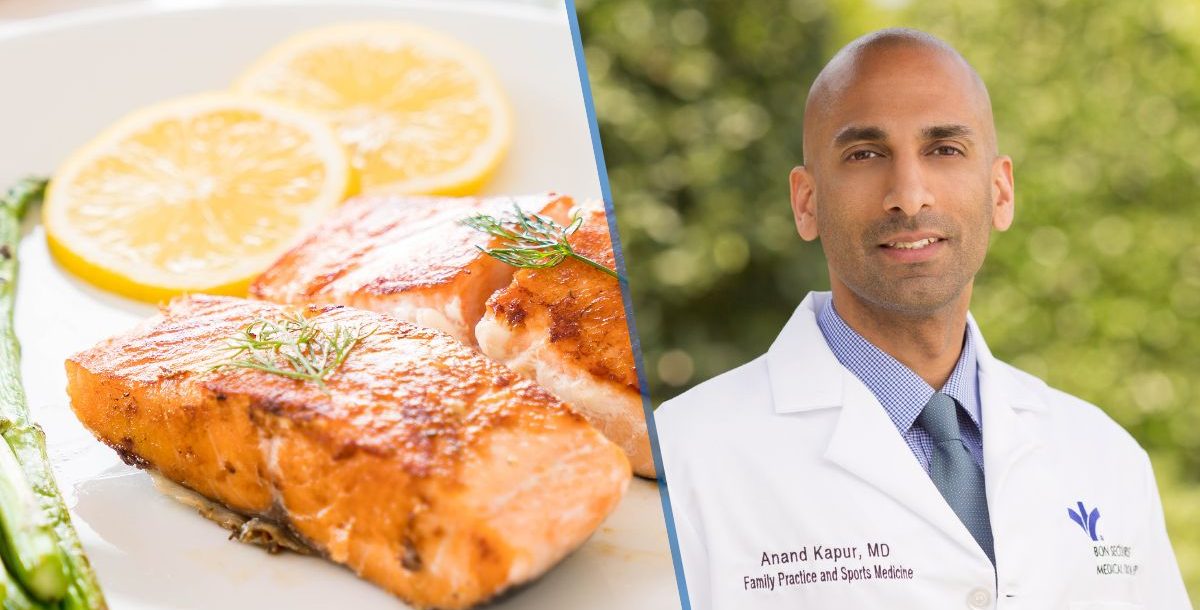To lead a healthy life, it’s important to think about what goes into your body. A healthy diet can help prevent disease, boost energy, lighten mood, improve digestion and even keep extra pounds off. One of the best meat and protein choices for good health is fish. However, there are both advantages and disadvantages of eating fish regularly.
“I try to advise patients who currently do not eat fish to consider replacing red meat in their diet a few days per week,” Anand Kapur, MD, a primary care physician at Bon Secours Harbour View Family Practice, shares.
Interested in optimizing and learning about what diet works best for you? Learn more about nutrition services at Bon Secours.
Why is it healthy to eat fish?
At a high level, fish is packed with essential nutrients that should be an important part of a healthy diet. But what exactly does that mean?
Most fish have both vitamins and minerals that help your body function to the best of its ability. Some of the vitamins in fish include vitamin B2, which can help reduce nerve inflammation, and vitamin D, which helps keep your bones strong and helps control blood pressure, among other things.
As for the minerals you can get from eating fish, they include:
- Iodine
- Iron
- Magnesium
- Potassium
- Selenium
- Zinc
You’ve probably heard multiple times how fish are also a rich source of omega-3 fatty acids, especially fatty fish. But what are those? Omega-3s are found in fish oil and are important because they are especially helpful for your blood vessels, eyes, heart, lungs and immune system.
Research has shown that omega-3s may help:
- Prevent inflammation, a key symptom of arthritis
- Reduce the risk of heart disease, abnormal heart rhythm, cardiovascular disease, heart attack and stroke
- Support brain health, which lowers risks for Alzheimer’s disease, dementia and depression
And if you are dreaming of healthy hair and skin, eating plenty of fish high in omega-3 fatty acids has also been known to help with hair growth as well as hydrating your skin.
What is the proper serving size for fish?
One serving size of cooked fish is considered to be about three ounces. This equals a filet about as big as your palm, or roughly three-fourths of a cup of flaked fish.
And if you’re mindful of food waste, remember that you can eat the skin of fish as well as the meat. Fish skin is a rich source of good fats, protein and vitamin E. For crispy and delicious fish skin, pan-fry or grill your fish, skin side down, over high heat.
Are there disadvantages of eating fish regularly?
There are some risks of eating fish every day that you might want to consider.
First, polychlorinated biphenyls (PCBs) are harmful industrial chemicals that can get into the air and water. Amounts of PCBs, as well as mercury, can then build up in fish. Since there is no way to know the amount of buildup, the only true way to control your exposure is to limit how much fish you eat.
Since mercury is linked to problems with brain development, pregnant women should only eat fish once a week and also opt for low-mercury types. These include salmon, sardines and trout.
“Try to avoid the mistake of thinking all fish are healthy and then fall into the trap of consuming fish that are fried or soaked in unhealthy sauces that can be high in sugar or butter,” Dr. Kapur adds. “Baked or pan-fried fish is what we recommend.”
So, how often should you eat fish?
According to the American Heart Association, two servings is the recommended amount of fish to eat each week.
And if you are looking for the best sources of healthy omega-3 fats, stock your grocery cart with these types of fish:
- Anchovies
- Black cod
- Bluefin tuna
- Cobia
- Herring
- Mackerel
- Salmon
- Sardines
- Striped bass
- Trout
- Whitefish
And what about eating raw fish, like certain types of sushi?
Although raw fish can contain harmful microorganisms, it’s not as dangerous to eat as other types of raw meat. Freezing can help make it safer, though.
For the best results, fish should be frozen for at least seven days. When eating raw fish in restaurants, make sure to ask about freezing policies. And to be on the safe side, pregnant women should steer clear of raw fish entirely.
Learn about the primary care services we provide at Bon Secours.





